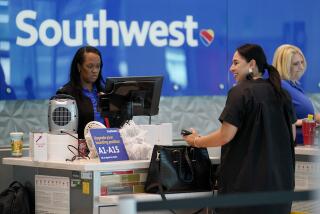Dollar Goes Further, for Now, on Package Tours
- Share via
Is the recent weakness in the dollar making you reconsider your European vacation? If so, there are several ways to cut vacation costs--including one that parlays the currency swings in your favor.
One dollar buys nearly 12% less in France and about 10% less in Germany than it did six months ago. It’s lost nearly 6% of its value when measured against the British pound.
But that need not worry travelers. Money-saving gambits, such as booking land tours from U.S. wholesale tour operators, securing car rentals in advance and staying--and eating--in out-of-the way places can lower your vacation expenses 20% to 40% even in these dollar-devaluated days.
In today’s market, the biggest savings come from booking a land tour.
Why? Tour operators, who rely on travel agents to send them business, price their vacation packages in the fall for sales the following summer. That allows them time to produce the slick brochures they send to the travel agents who sell the trips to their clients.
Last fall, the dollar was strong. Indeed, it was so strong that many European tour operators cut the prices of their vacation packages by hundreds of dollars. If the dollar continues to slide next year’s European vacationers will pay for it, but for now, tourists can get bargains.
Just how big a bargain?
Consider the one-week “land package” offered by Globus Tours in London.
The $538 price covers six nights at the St. Ermin’s Hotel near Parliament, continental breakfasts, airport-to-hotel transfers, half a day of sightseeing, a theater ticket and a two-day transportation pass that gives unlimited access to London bus and underground rail transportation in London, says John Martinen, president of Globus and Cosmos Tourama in Littleton, Colo. (The rate assumes an August departure and double occupancy.)
If you were going on your own at the same time, the “rack rate” at St. Ermin’s--the price of a room for one night without a corporate rate or volume discount--would run $634 a person, based on double occupancy. Taxi rides to and from the airport would cost roughly $50 a person--assuming two people share the cab, experts estimate. If you add the costs of the sightseeing, bus passes and theater tickets, each traveler could easily save $200 by choosing the tour.
And the Globus deal is not unique.
Trafalgar Tours U.S.A. Inc. has an 11-day, nine-night trip to London, Paris and Rome. This so-called “Free and Easy” trip is popular with vacationers who usually shun bus tours because it has few frills like group dinners or approved sightseeing, says Nigel Osborne, vice president of sales and marketing for the New York-based tour operator.
The budget version of the trip costs $750, Osborne adds. International travel experts estimate that’s at least 20% cheaper than what it would cost to duplicate the tour on your own in today’s market.
If you’re a seasoned traveler and don’t mind staying in smaller, out-of-the-way hotels, you could probably travel more cheaply by avoiding tourist hotels and staying in the outskirts of town, says S. Enders Wimbush, senior international consultant for Runzheimer International in Burlington, Wis. But if you don’t speak the language and are unfamiliar with the city, the package deals are a value, he says.
Nonetheless, there are some disadvantages to package tours. Most specifically, freedom. The tours leave and arrive on specific dates at specific times. If you’re traveling from city to city, you usually must have your luggage ready and in front of your door before 8 a.m. You also have to accept that you’ve signed on for a group activity that will land you in a bus with 35 to 40 strangers when taking the planned sightseeing or transfers.
If all that togetherness leaves you cold, there are other ways to save on travel to Europe, Wimbush notes.
For example, if you’re planning to rent a car, arrange it through a U.S. company in advance, he suggests. Renting in Europe can cost 50% more because there are fewer cars available and fewer rental companies.
Also, avoid eating and staying in tourist areas whenever possible. Hotels and meals in the big cities generally cost 30% more than similar food and lodging at out-of-the way establishments.
Choosing American cuisine over local offerings is also costly. A full “American breakfast” of eggs, bacon, toast and juice can cost $30 or $40 in Europe, but a continental breakfast of rolls with coffee or juice typically goes for less than $10. Sometimes it’s even free. Many European hotels include continental breakfast in the price of the room.
Finally, Wimbush suggests that you use a credit card, since credit card companies can exchange currency at somewhat more favorable rates than individuals can. That’s because they’re dealing in volume, exchanging millions of dollars in currency at a time. They pass on those discounts to customers.
However, be sure to pay your credit card bill promptly. If you don’t, the monthly interest charges could add up to more than you saved on the currency exchange.
More to Read
Sign up for The Wild
We’ll help you find the best places to hike, bike and run, as well as the perfect silent spots for meditation and yoga.
You may occasionally receive promotional content from the Los Angeles Times.






